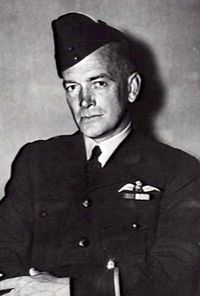Frederick Scherger Military person
Air Chief Marshal Sir Frederick Rudolph William Scherger, KBE, CB, DSO, AFC (18 May 1904 – 16 January 1984) was a senior commander in the Royal Australian Air Force (RAAF). He served as Chief of the Air Staff, the RAAF's highest-ranking position, from 1957 until 1961, and as Chairman of the Chiefs of Staff Committee, forerunner of the role of Australia's Chief of the Defence Force, from 1961 until 1966. He was the first RAAF officer to hold the rank of air chief marshal.Born in Victoria of German origins, Scherger graduated from the Royal Military College, Duntroon, before transferring to the Air Force in 1925. He was considered one of the top aviators between the wars, serving as a fighter pilot, test pilot, and flying instructor. He held senior training posts in the late 1930s and the early years of World War II, earning the Air Force Cross in June 1940. Promoted to group captain, Scherger was acting commander of North Western Area when Darwin suffered its first air raid in February 1942. Praised for his actions in the aftermath of the attack, he went on to lead the RAAF's major mobile strike force in the South West Pacific, No. 10 Operational Group (later the Australian First Tactical Air Force), and was awarded the Distinguished Service Order in September 1944 for his actions during the assaults on Aitape and Noemfoor in Western New Guinea.After the war, Scherger served in senior posts, including Deputy Chief of the Air Staff, Head of the Australian Joint Services Staff in Washington, D.C., and commander of Commonwealth air forces during the Malayan Emergency. In 1957, he was promoted to air marshal and became Chief of the Air Staff (CAS), presiding over a significant modernisation of RAAF equipment. Completing his term as CAS in 1961, he was the Air Force's first appointee to the position of Chairman of the Chiefs of Staff Committee (COSC). As Chairman of COSC, Scherger became Australia's first air chief marshal in 1965, and played a leading role in the commitment of troops to the Vietnam War. Leaving the military the following year, he was appointed Chairman of the Australian National Airlines Commission and, from 1968, of the Commonwealth Aircraft Corporation. Popularly known as "Scherg", he retired in 1975 and lived in Melbourne until his death in 1984 at the age of seventy-nine.
Search
Military person
| allegiance | Australia |
|---|---|
| award | |
| military operations | |
| military branch | |
| military command | Chief of the Air Staff (1957–1961) Chairman COSC (1961–1966) Directorate of Training (1938–1940) First Tactical Air Force (1945) No. 10 Group (1943–1944) No. 2 SFTS (1940–1941) No. 2 Training Group (1943) RAAF Station Darwin (1941–1942) RAF Air HQ Malaya (1953–1955) |
| service start | 1921 |
| service end | 1966 |
